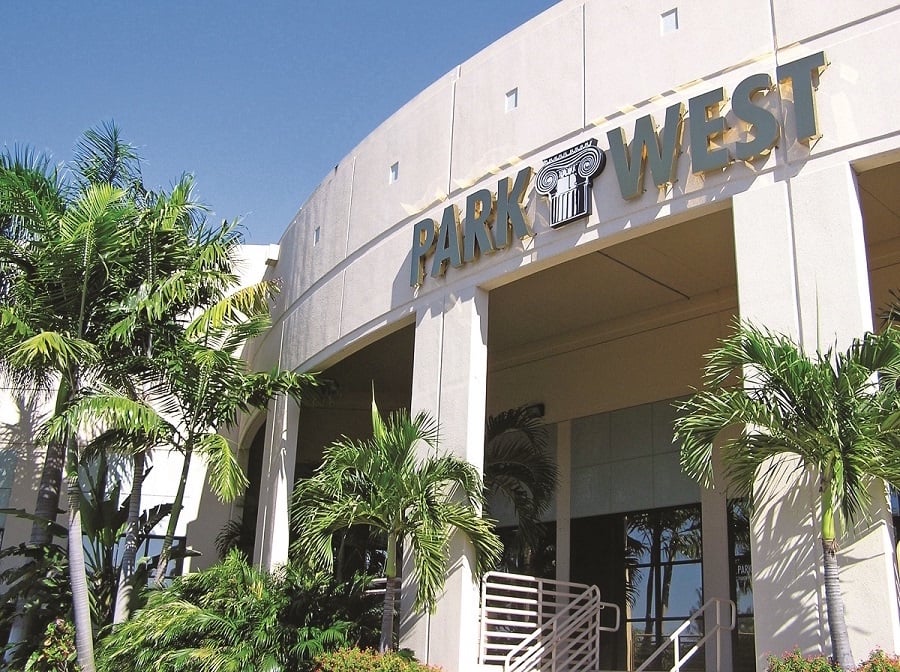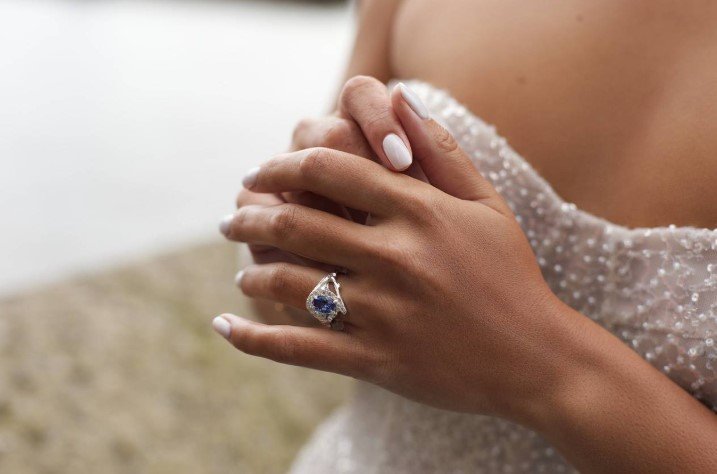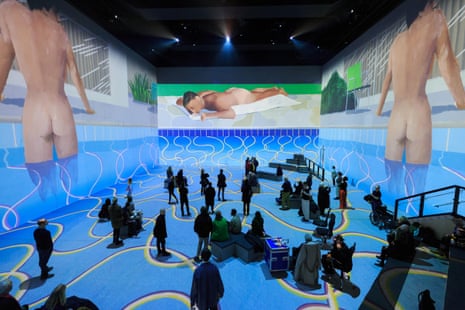It might be the biggest mega-gallery you’ve never heard of. Park West, the 53-year-old Southfield, Michigan-based company best known for auctioning art on cruise ships, deals mainly in affordable art priced in the four and five figures—but sells a lot of it.
While juggernauts such as Pace, David Zwirner, and Gagosian don’t typically release annual sales figures, media reports in 2016 estimated Gagosian’s at $1 billion and David Zwirner’s at more than $500 million. Park West says its annual sales, too, are “in the hundreds of millions of dollars,” and that it gets there by selling thousands of lower-cost prints and paintings to its more than two million clients.
“There is an entire world out there that really doesn’t know we exist, or sort of knows that we are tangential to the rest of the art world,” said John Block, the company’s executive vice president who is aiming to change Park West’s less-than sterling reputation in the industry.
In late 2022, the gallery opened a brick-and-mortar space in the SoHo neighborhood of New York, a more than 4,000-square-foot venue to show historical artists such as Picasso, Rembrandt, and Salvador Dalí alongside work from some of the roughly 100 living artists Park West works with, including Kre8, Yaacov Agam, Hunt Slonem, Mark Kostabi, and Tim Yanke. It also recently opened spaces in Las Vegas and Honolulu.
“We have wonderful artists and great art and comparatively economical prices. We wanted to be able to showcase them in a different venue,” Block said.
But as it sets out to embark on a new chapter, Park West is also having to contend with its past. If there’s anything the gallery is known for besides art on cruise ships, it’s lawsuits. At this time 15 years ago, the niche business that had proved so lucrative also sparked a flood of lawsuits from disgruntled buyers who alleged the company engaged in aggressive sales practices, misrepresented artworks’ value, and sold inauthentic work. More recently, the gallery has been engaged in a bitter legal battle with the family of Peter Max, one of its bestselling artists.

Interior of the Park West warehouse in Miami Lakes, Florida. Image courtesy Park West.
Today, Park West is presenting itself as a humbled, cleaned-up operation. Executives say they have implemented an “aggressive” compliance department that meticulously reviews videotapes of all its auctions and seminars to make sure sales are conducted properly—and that they no longer make any promises about the purported value of the art as an investment.
A Pandemic-Driven Pivot
In April 2020, when the pandemic decimated the cruise ship industry, Block began looking for alternative ways of selling art. Football season, too, had been put on hold, so he got the idea to recruit a production company that previously worked with the NFL to help Park West begin live-streaming art telecast auctions.
“We think we were the first ones to do it as a solution to the pandemic,” said Block. “We went live in April and in our first broadcast, we sold $1 million in art and then throughout 2020, we sold $140 million in art.”

A multi-day VIP event hosted by Park West at the Meritage Resort & Spa, in Napa, California, September 2022. Image courtesy Park West. Photo by Jack Simpson Photography.
Today, Park West holds four telecast auctions each weekend, where it offers between between 2,000 and 3,000 works.
In all, Park West employs about 2,000 people, including full-time employees and independent contractors, such as ship workers.
Now that the travel industry has largely rebounded from the pandemic, Park West is back in full force on the cruise ships. In 2022, it sold art on more than 4,300 cruises compared with more than 4,500 in pre-pandemic 2019.
To supply this massive amount of work, Park West operates a 181,000-square-foot distribution center in Miami Lakes, Florida, where roughly 600 people frame, mat, conserve, and ship thousands of works of art.
‘We Were Always a Bit Different’
The name Park West is itself a reference to the gallery’s early days running a space on Central Park West. Founder and CEO Albert Scaglione formed the company in 1969, trading a career in science and space exploration for one in the arts.

Yaacov Agam giving Park West collectors a personal tour of the Yaacov Agam Museum of Art in Rishon LeZion, Israel. Photo by Shooka Cohen. Image courtesy Park West Gallery.
“We were always a bit different than your average art gallery,” said Albert’s son and current president Marc Scaglione. “We took the same concept that the French had been doing for decades… where they hold auctions in fine hotels and sell antiques and artworks.” The gallery trucked art to 60 cities around the U.S. “Clients would bid on it and at the end of the day, they would pay for it and literally load in their car and drive away with it.”
Then, everything changed “substantially and forever” in 1995, when the company started selling on cruise ships for the first time.
“We touched a market segment that we had never been able to before, which is essentially seeing maybe upwards of 200,000 people could go through galleries on the cruise ship and then a certain number would attend our seminars and auctions and a certain number would buy,” said Scaglione. “Four ships became eight, and eight became 16. It was an ever-growing number.”

Installation view of works by Kre8 at Park West Gallery in New York. Image courtesy the artist and Park West Gallery. Photo by Golden Jones Photography.
The company’s affiliation with cruise ships also changed its reputation in the traditional art world. Gallery representatives often point out that they are snubbed by many elite art insiders, but also say they take it in stride.
“Because we’re reaching so many people who have never experienced art before and stimulating them to really enter into the world of appreciating art and collecting art, we’re actually doing a favor to most of the galleries that deprecate us,” said Morris Shapiro, Park West auctioneer and senior gallery director. “People going into galleries, checking out and viewing the websites, and going to the estate auctions is broadening the base of people entering the art world. What we’re doing is keeping the art market thriving and moving.”

Park West Gallery in Honolulu, Hawaii. Image courtesy Park West Gallery.
Artists whose work doesn’t necessarily find a home in traditional galleries have also benefited from the arrangement. Kevin Vigil, an artist who goes by the name Kre8, calls his involvement with Park West “an amazing experience. They really put your name out there. Park West tells you out of the gate, ‘we’re going to expose you to a large audience.’ It’s a blessing for artists.”
To date, Kre8 has held more than 30 sold-out shows with Park West. His graphic works start at less than $1,000, while his paintings sell for on average between $3,000 and $20,000 each.
Choppy Waters
The company acknowledges that selling art on cruise ships has not always been a smooth ride. The novel business that made Park West famous has also made its name notorious.
In the late aughts, numerous buyers accused the company of a laundry list of wrongdoing, including misrepresenting the value of art it sold, fraud, breach of contract, and negligent misrepresentation among other claims. Attempts to obtain class-action status through courts in various states were all unsuccessful and the cases were eventually settled or dismissed. Since 2008, Park West had been subject to nearly a dozen lawsuits alleging abusive sales practices, according to the Art Newspaper.
“Those cases were all settled on terms that are confidential but very favorable to Park West,” said the company’s attorney, Paul Schwiep. “The plaintiffs’ lawyers essentially threw in the towel and they were resolved. That was around the 2009 time frame.”
“Park West sells hundreds of thousands of works of art a year,” Schwiep added. “They have no client right now that has filed a lawsuit against them. That’s pretty amazing.”
Perhaps most famously, in April 2019, Park West sued the studio of Pop artist Peter Max, one of its most lucrative artists. The gallery alleged breach of contract and misconduct related to the sale of several thousand works of art, purportedly worth millions.
Park West said it had a contract to buy a group of “personal selections” from ALP, the company that runs the Max studio and business. But ALP attempted to rescind the sale of the Max works, a mix of paintings and collages, according to the lawsuit.
The litigation is still pending. “We purchased art in the normal course,” said Schwiep. “New ownership came in and has tried to renege on the contract. We do not believe a court will allow them to unwind an arms-length purchase.”
An attorney for ALP did not respond to a request for comment.
Park West has also spearheaded its own spate of lawsuits in the past, namely against people it accuses of defaming the company via online activity and comments.
A defendant in many of the cases was Theresa Franks, an art entrepreneur who Park West said retaliated after it declined to do business with her. Franks “went on a crusade against Park West,” said Schwiep, adding that she riled up others to join her in defaming the company online. “People that she quoted were joined into a defamation case. Most recanted their statements in sworn affidavits. The case with Franks settled.”
Franks, who countersued, was awarded $500,000, though that was later vacated due to misconduct by her lawyers during the trial, according to court documents. Franks could not be reached for comment.
In recent months, an Australian client of Park West, Gary Cream, reached out to Artnet News to report that he had spent $169,000 on artworks by Peter Max from Park West between 2016 and 2019. Park West, which has an appraisal service, told him it was worth $215,000, he said. He then approached some 50 galleries and auction houses about potential resale, but was told that the work is only worth a cumulative maximum of $25,000.
“Park West initially agreed to refund our money but from further communications with them we thought they were totally trustworthy and decided to keep the art. When the issue was raised again they basically told us to get lost,” Cream told Artnet News in an email.
The company’s policy allows buyers to exchange an artwork with another one of equal or lesser value within 50 months of purchase. It also provides “replacement value” appraisals for purchased works upon request. If clients request fair market value assessments, the gallery will often arrange it through an outside independent appraiser.
“From time to time, as in any major purchase, people experience buyers’ remorse and they regret their decisions,” Schwiep said when asked about Cream’s complaint. “That occurs and sometimes folks come up with pretextual reasons to try and rescind a purchase. In every case where we’ve engaged those clients and provided them the support for the valuation provided and addressed their concerns, the situations have resolved amiably.”
Schwiep and Block said there is currently no client litigation against the company. But one cruise passenger recently claimed in a lawsuit that she was raped by, and contracted HIV from, a Park West gallery employee aboard the Sky Princess cruise ship in January 2022.
“The nature of the acts alleged in the complaint warrant a very serious examination that separates the facts from fiction,” Schwiep said in an email. “At this time, no evidence has been provided to support the allegations made in the complaint, and no notice of this alleged incident was provided to us, the cruise line or law enforcement, even though the incident alleged occurred a year ago. In the company’s 25 years of successfully operating on cruise ships, there has never been an allegation of this kind made against an auctioneer. We are in the early stages of conducting what will be a very thorough and searching investigation of what has been alleged.”

The Park West warehouse and distribution hub in Miami Lakes, Florida. Image courtesy Park West.
A New Beginning?
Block attributes some of the unhappy outcomes in the past to the fact that many of the company’s clients are new to buying art.
“We bring people into the art market by the truckload, and maybe they’ve never been there before. So you’re gonna get places where we fall down because of working with people who never bought art,” he said. “The net result is so positive though. We try to educate like crazy, so that the person who starts out collecting a $100 giclee becomes one of these people on an around-the-world [VIP] cruise.”
With New York the latest in the string of new bricks and mortar gallery locales, Block said: “We started looking at the places where we felt we would have a nice mix of tourism and local traffic, and that’s why we came up with Las Vegas and Honolulu and then obviously New York. If you’re an art company then you have to plant a flag in New York at some point.”
“I’m most excited about the people that Park West has introduced to the art market,” Block said. “Most of our collectors who come through Park West tell us ‘I never thought I’d be collecting art.’ I get fired up about that.”
Follow Artnet News on Facebook:
Want to stay ahead of the art world? Subscribe to our newsletter to get the breaking news, eye-opening interviews, and incisive critical takes that drive the conversation forward.





More Stories
Turner’s watercolours are at the National Gallery of Ireland for January. It’s worth seeing them in person – The Irish Times
National Gallery spent more than $2-million on severance over period of 2 ½ years
National Gallery of Canada’s show must go on – minus senior curators (for now)